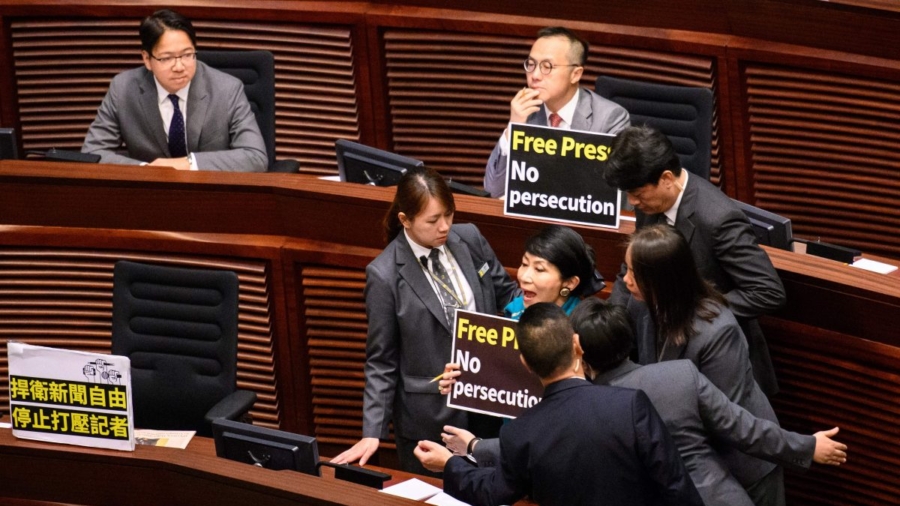WASHINGTON—When the United Kingdom handed over Hong Kong to the People’s Republic of China, a treaty guaranteed the city would retain its way of life through the adoption of the policy of “one country, two systems.” An expert who monitors Hong Kong’s freedoms came to Washington to warn U.S. legislators that this policy, which was meant to preserve the rule of law and protections for human rights, is threatened with becoming meaningless.
According to Benedict Rogers, chair of trustees of the UK-based group Hong Kong Watch, the “final straw” in the degradation of Hong Kong’s special status would be the passage of Article 23 of the autonomous territory’s Basic Law.
Rogers said at an event hosted by the NGO Citizen Power For China/Initiatives for China in Washington on Nov. 1, that since the student-led pro-democracy protests of 2014, Hong Kong has experienced an unprecedented crackdown on its freedoms.

Student protesters have been imprisoned; political candidates have been disqualified from running for election, and legislators have been barred from the city’s legislature. Press freedom, academic freedom, and the rule of law are all facing pressure in an atmosphere where the Chinese Communist Party’s authoritarian rule increasingly limits freedom.
Now, pressure has been building for the current administration to enact Article 23, which stipulates that the city should pass a national security law prohibiting treason, secession, sedition, and subversion.
Plans to roll out the law in 2003 failed, after at least 500,000 people marched from Victoria Park to the Government of Hong Kong’s Central Offices to protest against it, which could have been used by the government to curtail freedom of speech and other civil liberties.
The current version of Article 23 has tougher provisions than the 2003 version.
Fifteen years later, however, Rogers said: “With the system that is in Hong Kong at the moment, where Beijing is more and more encroaching every day, and there is no representative democracy, no universal suffrage, Article 23 poses the most serious threat to basic rights. So I think that should be the line that the U.S. should be watching and should be ready to act if that happens.”
During this trip, Rogers delivered this message to officials of the U.S. State Department and the staff of different congressional offices including that of House minority leader Nancy Pelosi (D-Calif.), Rep. Joe Wilson (R-S.C.), Rep. Brad Sherman (D-Calif.), Congressional-Executive Commission on China (CECC) chair Sen. Marco Rubio (R-Fla.) and CECC co-chair Chris Smith (R-N.J.), among others.

A piece of legislation passed in 1992 could be the occasion for registering U.S. unhappiness with changes in Hong Kong.
The Hong Kong Policy Act gives Hong Kong a special status by allowing the United States to continue to treat the city separately from mainland China for matters concerning trade export and economics controls after the 1997 handover.
Rogers said he has been asking people, “if Hong Kong’s autonomy continues to erode, ‘one-country, two-systems’ continues to be virtually dismantled, and if Hong Kong just becomes another Mainland Chinese city, why should it have that special status?”
“I don’t have a case at this stage for dismantling the ‘Hong Kong Policy Act’ and special status for Hong Kong,” Rogers said. “I do think it should be reviewed and it should be on the table. Hong Kong and Beijing should be left to no doubt that if further erosion occurs, the U.S. should be prepared to take these measures.”
Rogers co-founded Hong Kong Watch in 2017, an advocacy organization to speak up for Hong Kong’s freedom and the rule of law, after he was denied entry to Hong Kong upon arrival on Oct. 11, 2017, on the orders of the Chinese government, an incident which drew international media attention widely.
From The Epoch Times

